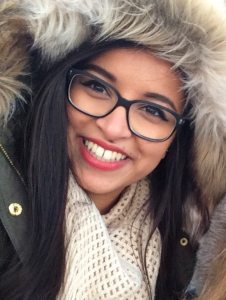
Yasmine Albayyat, 17, lives in Saudi Arabia’s capital city of Riyadh, a city with a population of more than 4 million. She had visited Florida, New York and Boston with her family before coming to live in Jefferson this school year. “I wanted to know what it’s actually like to live in the US,” she said.
The first lesson she learned was about population. “When I first came, I couldn’t believe there could be such small towns, and people told me there are even smaller ones,” Albayyat said.
Albayyat arrived in Iowa Aug. 14. She’s living with Pastor Julie Poulsen and Dennis Fox. Albayyat is in Iowa under the auspices of Iowa Resource for International Service (IRIS), within the Kennedy-Lugar Youth Exchange and Study (YES) program. The YES program is funded by the US State Department and works to bring students from predominantly Muslim countries to the States. Albayyat is the fifth YES student Poulsen and Fox have hosted. Last year, they were the host family for Rubab Malik of Pakistan and Ruhaf Ruby of Palestine. They hosted two students from Nigeria before moving to Jefferson.
Albayyat speaks American English that is indistinguishable from an Iowa teen’s. Her mother, a sonographer, and her father, who works in the Saudi Stock Exchange, both studied in the States. They speak Arabic and English at home, and Albayyat has attended an international school taught in English since sixth grade.
She has a definite purpose in her time here. “People hear about the terrorists, and they’re so scared. I want people to know that that’s not how we all are. The terrorists are the extremists. You can’t compare those thousands to the billions of normal Muslims. We’re normal people and Islam is a really peaceful religion. Those extremists are the ones who are representing the billions, which is completely wrong,” she said. “I want to be one of those people to explain that we’re not like that, and change a lot of people’s minds, hopefully.”
“That little group, doing all those extreme things, are how people see all Muslims. That’s completely wrong,” she said.
Islam means “peace,” and “submission to God.” “Compared to those extremists, I know my religion. I know where I come from, and how peaceful it is,” she said.
There are 1.5 billion Muslims in the world, but they’re ineffective at controlling the extremists. Poulsen compared the extremists to middle school bullies; the vast majority of peaceful Muslims are frightened and remain quiet. “There are people in Saudi trying to organize against terrorists, but people don’t hear about them,” Albayyat said.
The black abaya worn by Saudi women is one of the most obvious differences between the cultures. Albayyat explained that the abaya shows modesty, and that men also cover their clothing with a white galabiyya. They’re only worn in public over Western clothing. “The abaya is good. When I go to a friend’s house, I can wear anything I want, and while I ride in the car, no one knows. I take it off to when I get to my friend’s house, and it’s good,” she said.
Saudi Arabia is the only absolute monarchy in the world. Albayyat is comfortable living under the authority of a king. Saudi King Abdullah died Jan. 23 and his brother Salman ascended to the throne. “I was very sad when King Adbullah died. It felt like I lost a father,” she said.
He was popular and struck a good balance between tradition and Western influence. King Abdullah had served as ruler for 20 years, the first 10 as de facto ruler after King Fahd suffered a serious stroke. He became king in 2005. During his rule, women gained the right to vote in municipal elections, and Albayyat’s mother’s generation is the first in which women can pursue a profession. Women still can’t drive and are cared for by their fathers, husbands or brothers. “That’s not political. It’s religious,” Albayyat said.
Among affluent Saudis, politics is not a topic a topic of conversation, Albayyat said. Saudis don’t criticize the king, the government, or Islam. “We talk about those things, but only with or friends or family. You don’t have to announce what you think everywhere,” she said.
Albayyat hopes not only to share Islam, but to learn about Christianity while she’s in Iowa. Both religions have their base in the Old Testament. Islam acknowledges Jesus Christ as a prophet, not the Son of God. The Prophet Mohammad originated Islam as the only religion acceptable to God, rather than the polytheism of the Arabic world.
Aside from the understanding of the roles of Jesus Christ and the Prophet Mohammad, Christianity, Islam, and Judaism use the same ethical system, Poulsen said.
The practice of Islam includes a Call to Prayer five times a day, with each time having a prescribed, rote prayer. Albayyat has maintained that practice even at Greene County High School, finding a place for the midday prayer. The dawn, late afternoon, dusk and evening calls to prayer do not fall during the school day.
What Albayyat tells as being the typical Saudi view is Americans is good news and bad news. Saudis think Americans are in general, hard working. They also think of America as being a country where racism continues. She is grateful to her host parents. “Julie and Dennis are amazing. I’m so comfortable. It’s like my own family is here, because of them,” Albayyat said.
Albayyat will welcome invitations to speak. Poulsen will welcome opportunities to talk about hosting students through IRIS. They can be contacted by calling the Methodist Church at 515-386-4411.
